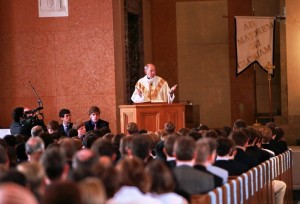Politics and Pulpit: “Uninhibited, Robust and Wide-Open!” Part One
 It’s an election year, and it’s time to open our mouths, in the Church, about politics, candidates, and the right to life.
It’s an election year, and it’s time to open our mouths, in the Church, about politics, candidates, and the right to life.
Our fight for our unborn brothers and sisters is a fight for freedom and against tyranny; for people and against oppressive governments. Our Founding Fathers fought this fight, and so must we, with the same readiness for self-sacrifice.
This is true for every American. How much more true is it for us as the Church, as disciples of the Lord Jesus Christ? The Gospel is a Gospel of freedom. “I have come to proclaim liberty to the captives…to let the oppressed go free,” Jesus said in defining his mission.
Carrying out this mission requires the freedom to speak the truth as we understand it. Not only was this fundamental right explicitly acknowledged by our Founding Fathers and placed at the top of the Bill of Rights, but it has been affirmed time and time again by the Supreme Court, not only to point out the existence of such freedom, but also its characteristics.
In New York Times Co. v. Sullivan (376 U.S. 254, 270 (1964)), the Court asserted that the protection of citizens to advocate for particular issues reflects our “profound national commitment to the principle that debate on public issues should be uninhibited, robust, and wide-open” (emphasis added).
In 2010, the Supreme Court also affirmed the following:
“Speech is an essential mechanism of democracy, for it is the means to hold officials accountable to the people. The right of citizens to inquire, to hear, to speak, and to use information to reach consensus is a precondition to enlightened self-government and a necessary means to protect it. The First Amendment ‘has its fullest and most urgent application to speech uttered during a campaign for political office.’”
“[I]t is inherent in the nature of the political process that voters must be free to obtain information from diverse sources in order to determine how to cast their votes.” (Citizens United v. Federal Election Commission, 558 U.S. 310 (2010)).
The corresponding freedom of the Church to speak and teach the truth — a freedom also contained in the Founders’ recognition of freedom of religion — is something explicitly insisted upon in the Church’s own documents. This freedom is, in fact, an essential aspect of the Great Commission left by Jesus Christ: “Preach the Gospel to every creature.” “Teach them to carry out everything I have commanded you.” Because the Gospel covers every aspect of life and human activity, the Church must also be free to comment on political matters. In this regard we see the following strong statement from the Second Vatican Council’s Constitution on the Church in the Modern World (Gaudium et Spes):
“At all times and in all places, the Church should have the true freedom to teach the faith, to proclaim its teaching about society, to carry out its task among men without hindrance, and to pass moral judgment even in matters relating to politics, whenever the fundamental rights of man or the salvation of souls requires it.” (n. 76)
In my upcoming columns, I will help us prepare for the midterm elections by reflecting on how we in the Church have often stifled this freedom, and why it is time to repent and open our mouths.

